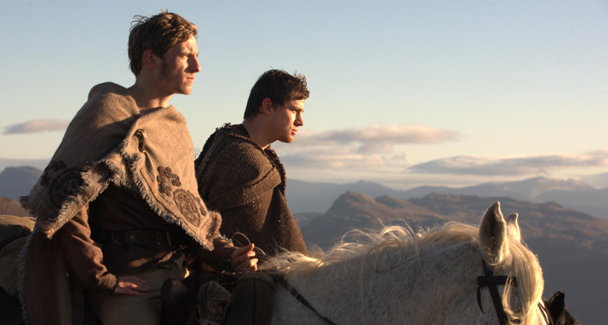The Eagle
What could have been an intelligent revival of the classics-themed adventure genre feels disappointingly standard issue
Plot summary
In 140 AD, twenty years after the unexplained disappearance of the entire Ninth Legion in the mountains of Scotland, young centurion Marcus Aquila arrives from Rome to solve the mystery and restore the reputation of his father, the commander of the Ninth.

The Eagle is the new film from acclaimed director Kevin MacDonald (The Last King of Scotland, Touching the Void). Being of Scottish origin himself, he was interested in the opportunity to film on location in Scotland – a key setting in Rosemary Sutcliff´s much-loved historical novel, The Eagle of the Ninth. It tells the story of Roman legions in ancient Britain, who fail to conquer the Caledonian lands of the north and lose their emblem, a golden eagle, in the process. A young Roman soldier, Marcus (Channing Tatum) takes a post in Britain with the goal of recovering the precious symbol that was lost by his father decades before. He takes an enslaved Briton, Esca (Jamie Bell) with him to act as an intermediary, even though his elders point out that trusting slaves to cater to one´s wellbeing is not especially wise.
Unlike the most recent Classics-themed piece of cinema, 300, The Eagle is played entirely straight. Cartoonish displays of musculature, power and homoeroticism are replaced by a more sober depiction of war. It is filmed in a grainy, dark tone that gives an almost documentary feel to battle scenes and helps you reimagine British scenery as an ancient landscape. Marcus’ slightly tedious quest (to restore the iconic eagle to Rome and so honour his family´s name) is taken very seriously indeed; he tends to divide his time between fighting, praying to the gods for guidance, and reiterating exactly what he intends to do, plus why he wishes to do so. This pompous storyline is brightened by the arrival of his slave Esca, who seethes discontentedly at his master, so adding a dimension for any audience members who don’t particularly care for the fate of the eagle, or, for that matter, Marcus.
The plot trundles on enertainingly enough, leading our heroes onto the highlands of Scotland, which make for an incredible backdrop for the unfolding drama. I felt bloody sorry for the actors and their historical predecessors – no one should ever have to ride across freezing rainswept moors for days on end with nothing but a small woolly brown cape for protection. Esca and Marcus encounter various Celts and Picts and Seals, all of which are portrayed as ravening savages. I’m sure the Scots will be thrilled to be compared unfavourably to our civilised Roman invader. Oh, and incidentally – there are no speaking roles for women. None – no wait, that´s not true: one does grunt at one point. But no actual, fully formed words emit from female lips in The Eagle, which has to be some kind of cinematic first for a film of this scale.
MacDonald claims to have selected an American for the role of Marcus in order to create a parallel between the empire-building of the ancient Romans and the aggressive globalisation espoused by modern America. This is an interesting angle on the story, but the critique of America gets muddied by the fact that Marcus and co. are consistently presented in a more positive light than the filthy natives they rule over. Even when atrocities committed by the Roman invaders are discussed, Marcus’ dedication to the glory of Rome never wavers. Perhaps that is the critique ofAmerica right there; but the treatment of his character (as a man of honour) suggests otherwise.
The problem seems to lie with the casting. Channing Tatum rarely transcends his tendency to resemble a prime cut of all-American beef, rather than a thinking, feeling person. He can flex his jaw muscles like mad, I´ll give him that. But otherwise his emotional range is limited to frustrated, angry and triumphant. None are wildly appealing to behold upon his particular face. Jamie Bell, on the other hand, is an accomplished and charismatic actor, and he almost carries the film. Almost, but not quite. His passive-aggression is much more watchable than Marcus’ aggression-aggression, and the mid plot twist is thoroughly enjoyable. But the final outcome does no credit to the themes that the usually excellent MacDonald should have developed further. As a manly tale of brotherly bonding and brutal warfare, this is a well-shot piece of entertainment. But the glamour of domination and dealing out violence is the key note played throughout, and so what could have been an intelligent revival of the genre instead feels disappointingly standard issue.











COMMENTS